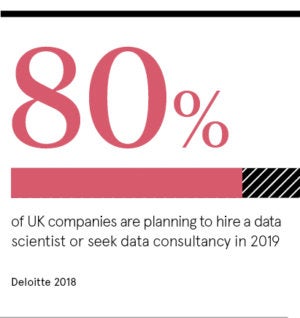Data scientists have for many years been considered a rarity which large enterprises have been fighting to get hold of.
Karl Hoods, chief digital and information officer at the Department for Business, Energy and Industrial Strategy, explains that as organisations have increasingly realised the importance and value of data, their need for the right expertise has also increased.
The future data scientist can tackle the most business-critical and complex challenges that will help their businesses make revolutionary leaps forward
“In trying to make sense of the vast amount of data gathered on a daily basis and use it to solve business problems, spot trends and make decisions to support new ideas, we need people with a mix of statistics, databases, data visualisation, machine-learning, coding and data preparation skills,” he says.
That mix of skills is exactly why data scientists are a rare breed. And the demand for them does not seem to be disappearing. According to a recent Data Surge Report by MHR Analytics, 80 per cent of UK companies are planning to hire a data scientist or seek data consultancy this year.
Data scientists suffering from having too broad a remit
Bernard Marr, data expert and author, suggests that while there is currently a massive talent gap in data science, as the number of data professionals increases over the coming years, companies will be looking for people with more specialised skillsets. This includes data science leaders, data translators, who can provide the link between the data function and the business, and domain-specialist data scientists.
The separation of different types of data scientists may have occurred because current data professionals have found themselves having to cover too much ground to manage what’s being demanded of them.
“This can sometimes be a case of trying to master both the technical and the business understanding and communication aspects of their role,” says Iain Brown, head of data science at SAS UK and Ireland.
SAS carried out research that found more than half of data scientists were reportedly suffering from some level of work-related stress due to such a broad remit.
“The shift towards sector-specific and less general data scientists is probably one that needed to happen anyway as the role was becoming too stretched,” Mr Brown says, adding that some organisations may need to consider skill-specific data scientists too.
How necessary is it for data scientists to know their sector?
 However, Caroline Carruthers, a former data leader at Network Rail and Lowell, says that even in the future, data scientists won’t necessarily only be hired if they have domain knowledge.
However, Caroline Carruthers, a former data leader at Network Rail and Lowell, says that even in the future, data scientists won’t necessarily only be hired if they have domain knowledge.
“Data is still data whether it sits in a retailer or a charity. It’s more important for employers to find data scientists who are able to harness their unending curiosity coupled with a logical and creative mind, and a background in making a quantifiable impact on their business,” she says. Mr Hoods adds: “Domain experience is useful, but it can be learnt.”
Michelle Wren, human resources director at Freedom Finance, recently had a requirement for a data scientist with a broad skill set encompassing data, analytics and soft skills, without the need for domain expertise.
“A recent hire took five months to recruit, and we found many applicants could be more selective with where and what they settle for,” she says.
The power, therefore, is still very much with data scientists. But with new technologies on the horizon, there is a view that the data professionals could automate themselves out of a job.
The future data scientists need to be even more specialised
Matt Cockbill, head of the IT and digital leadership practice at Berwick Partners, isn’t convinced. “It may have some hint of truth for lower-value data skills, but high-value, full-stack data science roles will continue to reform and reshape the world around them, creating continued heavy demand,” he says.
“Data scientist is a broad catch-all title. While we will see more specific career paths evolve, the bubble around data science and data engineering skills isn’t set to burst.”
Technology will give these professionals more capabilities, but it won’t mean their roles will be made redundant in the years to come. As Ms Carruthers says, it just means the overall level of data literacy will improve across the workforce, with other employees gaining a better understanding of how to use data more widely.
“The future data scientist can therefore be even more specialised, tackling the most business-critical and complex challenges that will help their businesses make revolutionary leaps forward,” she concludes.
Data scientists suffering from having too broad a remit
How necessary is it for data scientists to know their sector?




